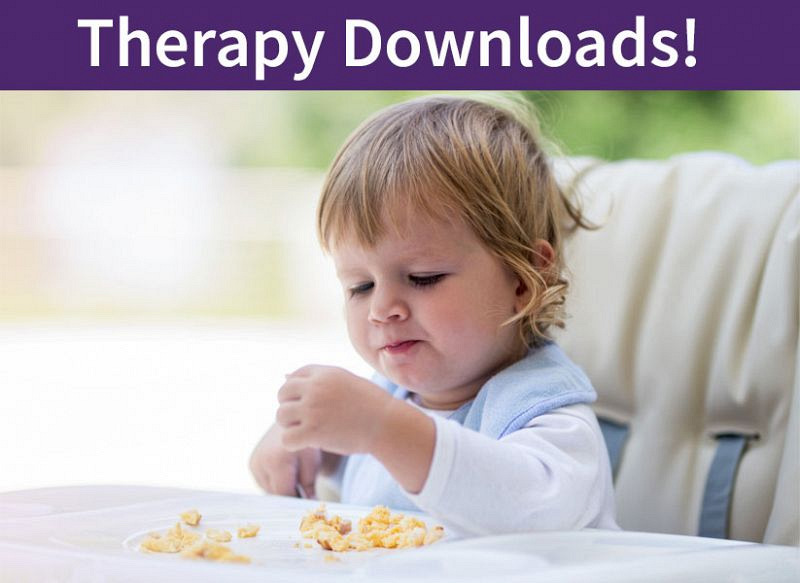Food Chaining Therapy “New Without No” – Overcoming Aversion, Sensory Challenges and Fear #e313
Presenters: Cheri Fraker, CCC-SLP, CLC & Laura Walbert, CCC-SLP, CLC
Learn strategies to help children eat safely, lower anxiety, expand the diet, improve nutritional status, and eat with joy.
"Presenters provided great ideas to implement right away. I liked the specific case studies where the presenters gave detailed steps and ideas that they used in therapy. This made it easy to think of new ideas to try in my practice."
– H.F., prior course participant
Read more comments about this course!
Need feeding therapy ideas? What to DO in treatment? How to offer new foods without NO? This treatment course demonstrates the how-to’s of PreChaining and Food Chaining over time. Learn fun and creative strategies for successfully implementing PreChaining and/or Food Chaining therapy for the child with severe to extreme feeding aversion.
Fear and anxiety derail feeding. This case study driven course instructs participants how to establish and maintain trust in a calm, child-led, sensory-safe learning environment. Learn diagnostic skills to analyze symptoms of complex feeding challenges. Detailed case studies are used to demonstrate from week to week how to help the child and their family make rapid and lasting gains, eat safely, lower anxiety, expand the diet, improve nutritional status, and eat with joy. Children ages 0-10 years will be the focus of this presentation.
Course is offered for 0.4 ASHA CEUs – 4 Contact Hours.
also see course #e161
“Treatment Of Picky Eaters Using Food Chaining”
Course Overview – Run Time: 4:00:02
- Food Chaining: The Steps
- Case Study – Waylon
- Chaining Checklist: Covering the Bases/Case Study – Steven
- Case Study – Jaxon
- Anxiety Management/Case Study - Adam
"All of the case examples and the case history at the beginning is going to change the way I practice. It was helpful to know in detail about your tx plan to expand what I am doing in practice for new ideas."
– A.F., prior course participant
Read more comments about this course!
This presentation will focus on the technique of Pre-Chaining and Food Chaining© developed by the course presenters. Other treatment approaches will receive limited coverage during this lecture. Presenter financial and non-financial disclosures may be found in the Presenter & Disclosures area.
Video PowerPoint presentation with author narration & downloadable handout. Stop and re-start the course at any point. Learners retain access to course content after completion for ongoing reference and review.
Reviews
"The entire course was relevant to my daily practice. I enjoyed the straightforward content as well as case study examples." V.S. (Jul. 2024)
"The concept of food chaining and the practical steps for using it in daily practice was beneficial. The course was easy to follow and implement." K.W. (Jul. 2024)
"Learning how to best reduce anxiety centered around new foods was a helpful topic. I liked the number of case studies that allowed different views on how to address food aversions and feeding disorders." M.T. (Jul. 2024)
"Discussing how to do Food Chaining was beneficial. The course was easy to follow." N.W. (Jun. 2024)
"Beneficial activity examples used during food chaining exercises. I liked the amount of information and real-world examples through case studies." A.S. (Jun. 2024)
"I liked the review of the 6 steps that must be considered when analyzing can't, won't, don't. The self-pacing option was great. The case studies were very helpful." J.T. (Jun. 2024)
"The information on food chaining was beneficial." S.M. (May 2024)
"Discussing ratings was helpful. I liked the online format and videos." C.W. (May 2024)
"Adams case study is similar to the patients on my caseload at my outpatient feeding clinic. All of the case examples and the case history at the beginning is going to change the way I practice. It was helpful to know in detail about your tx plan to expand what I am doing in practice for new ideas." A.F. (May 2024)
"I liked the concrete therapy ideas and detailed case studies." M.H. (Apr. 2024)
"I enjoyed the specific case studies and video of therapy." J.V. (Apr. 2024)
"Discussing the basics of food chaining was beneficial." K.G. (Apr. 2024)
"The specific evaluation and treatment examples were helpful. I enjoyed that I could complete it at my own pace and that the speaker was very knowledgeable." M.S. (Mar. 2024)
"Feeding in general- picky eaters was a beneficial topic." D.C. (Mar. 2024)
"Discussing food chaining and how it can apply to children with complex feeding disorders was beneficial. I liked the case studies and videos." B.P. (Mar. 2024)
"Chaining for children with sensory issues was beneficial. The information was relevant and useful. I can start working with students this week." H.M. (Feb. 2024)
"I liked the discussion on food chaining therapy and evaluating thoroughly." S.W. (Feb. 2024)
"Following the child's cues and making sure foundational feeding skills are worked on. I enjoyed the presentation and videos!" S.A. (Feb. 2024)
"It was beneficial gathering intake data and tools for the development of TX. I liked the examples of implementation of the tool." S.G. (Feb. 2024)
"I appreciated suggestions for using crumbs as a way to introduce tastes and textures. The case studies were very helpful." W.F. (Feb. 2024)
"I liked the therapy tools & clear explanations of how to implement food chaining." T.B. (Feb. 2024)
"Ideas for food chaining and real-life case studies." D.A. (Feb. 2024)
"I liked the case studies and practical ideas for treatment." K.H. (Jan. 2024)
"The nutritional aspect of feeding issues was a helpful topic. The information was provided in a clear and understandable way." K.S. (Jan. 2024)
"The comprehensive feeding history, differential diagnosis, and red flags were beneficial to discuss. I liked the strategies to decrease anxiety." N.H. (Jan. 2024)
"Discussing the chain order was beneficial." E.P. (Jan. 2024)
"Remembering to take it slow and build up trust and that it's not a race was beneficial. There were several case studies which were great to see different clients." K.M. (Jan. 2024)
"Beneficial case studies for application of food chaining and evaluation materials. I liked that this course was a self-paced online option that had applied information in the form of case studies." J.J. (Jan. 2024)
"The tools provided and examples used were helpful. The case studies were very applicable." N.B. (Jan. 2024)
"The case studies, examples of chaining, and products used to introduce foods were beneficial. I liked the fact I could go at my own pace." K.R. (Jan. 2024)
"Meal-time can be a very frustrating experience for both children and parents. I was surprised to learn how many factors can play a role in whether or not a food or liquid can be tolerated. This course was well organized, and I thought the presenters did a great job explaining the material." M.B. (Jan. 2024)
"I learned what I should be assessing before I start treating. This course was easy to listen to and watch while learning about helping children with eating resistance." N.L. (Dec. 2023)
"Ways to chain liquids, use of Duospoon and other tools to facilitate improved chewing and oral motor skills, ways to make food exploration enjoyable and fun. I love the divided plate with food for "looking" to provide exposure to new foods. Thorough course and provided multiple ways to address feeding skills. The case studies are very helpful." P.T. (Dec. 2023)
"The discussion of the case history, what to look for in the first year of life regarding feeding, as well as keeping a keen eye out for specific difficulties that show a 'can't' that is important to know about the child's feeding profile. I loved all the case examples that served as a basis to go through the food chaining steps." E.T. (Dec. 2023)
"The videos and the examples shown during the sessions were very helpful. The case studies showed a good variety of reactions the kids had to different foods and steps/techniques the SLPs took to help the kids." L.H. (Dec. 2023)
"This course was easy to follow. I enjoyed the food chaining techniques." L.L. (Dec. 2023)
"Food chaining and home training were beneficial topics." K.M. (Dec. 2023)
"I liked how the presenters can use one preferred food item and expand that one food item to additional types of food that use the preferred food item. The presenters were very detailed. I liked that they used actual clients to explain the food chaining process." E.V. (Nov. 2023)
"The anxiety portion was a beneficial topic. I liked that I could finish the course on my schedule." P.M. (Nov. 2023)
"This course was easy to listen to, and presenters provided great ideas to implement right away. I liked the specific case studies where the presenters gave detailed steps and ideas that they used in therapy. This made it easy to think of new ideas to try in my practice." H.F. (Nov. 2023)
"The individualized eating profile and food chaining examples were beneficial." C.L. (Nov. 2023)
Course Objectives
- Create treatment sessions.
- Describe the six steps of Food Chaining©.
- Identify roadblocks to eating and treat them using the Food Chaining© treatment worksheet.
- Identify signs of distress and describe three activities to use in sessions to decrease anxiety when food is presented.
- List the sensory progression of food exploration in Food Chaining© and create dynamic, fun food activities to achieve that progression.
- List 5-10 new similar food ideas and create a food chain.
Presenter & Disclosures

Cheri Fraker, CCC-SLP, CLC, is an ASHA certified pediatric speech pathologist who earned her Bachelor's and Master's degrees in Speech Pathology from Eastern Illinois University, Charleston, Illinois, 1986. Cheri's work in feeding is recognized internationally. She has published articles on Food Chaining in international medical periodicals, The Nest and Nutrition and the MD.
Cheri has worked in pediatrics for 28 years. She developed the techniques of Pre-Chaining and Food Chaining. Cheri has lectured on pediatric feeding disorders at ASHA, the UCLA/UMH Nutrition Leadership Conference, The American Academy of Cerebral Palsy and Developmental Medicine, The North American Society of Pediatric Gastroenterology, Hepatology and Nutrition and the 2004 World Congress of Pediatric Gastroenterology, Hepatology and Nutrition in Paris, France.
She is the co-author of the books "Evaluation and Treatment of Pediatric Feeding Disorders: From NICU to Childhood” and "Food Chaining: The Six Step Solution to Stop Picky Eating, Solve Feeding Problems and Expand Your Child's Diet." Cheri specializes in evaluation and treatment of pediatric feeding disorders and is the lead therapist for the pediatric feeding team clinic at The Center for Selective Eating and Pediatric Feeding Disorders and the SIU-Koke Mill Pediatric Swallowing Clinic in Springfield, Illinois.
Speaker Disclosures:
Financial — Cheri Fraker is a presenter of online CE courses offered by Northern Speech Services; receives royalty payments.
Financial — Cheri Fraker is the co-author of "Evaluation and Treatment of Pediatric Feeding Disorders: From NICU to Childhood" and "Food Chaining: The Six Step Solution to Stop Picky Eating, Solve Feeding Problems and Expand Your Child's Diet"; receives royalty payments.
Nonfinancial — Cheri Fraker has no relevant nonfinancial disclosures.

Laura Walbert, CCC-SLP, CLC, is an ASHA certified pediatric speech pathologist who earned her Bachelor’s and Master’s degrees in Communication Disorders and Sciences from Eastern Illinois University, Charleston, Illinois, 1996. Laura’s work in feeding is recognized internationally in medical journal periodicals and conference presentations on pediatric feeding disorders. Laura has also presented on evaluation and treatment of athlete’s with vocal cord dysfunction. She is the co-author of the books “Evaluation and Treatment of Pediatric Feeding Disorders: From NICU to Childhood” and “Food Chaining: The Six Step Solution to Stop Picky Eating, Solve Feeding Problems and Expand Your Child's Diet."
Speaker Disclosures:
Financial — Laura Walbert is a presenter of online CE courses offered by Northern Speech Services; receives royalty payments.
Financial — Laura Walbert is the co-author of "Evaluation and Treatment of Pediatric Feeding Disorders: From NICU to Childhood" and "Food Chaining: The Six Step Solution to Stop Picky Eating, Solve Feeding Problems and Expand Your Child's Diet"; receives royalty payments.
Nonfinancial — Laura Walbert has no relevant nonfinancial relationship to disclose.
Intended Audience / Accreditation

This program is offered for 0.4 ASHA CEUs (Intermediate Level; Professional Area).

Intended Audience
- Speech-Language Pathologists
ASHA CEUs: NSS online courses are registered with ASHA and are offered for ASHA CEUs. The number of ASHA CEUs is noted above. Note that 0.1 ASHA CEU = 1 contact hour = equals 1 CEE.
ASHA CE Registry: During the enrollment process, if you select to receive ASHA credit for this course and if you provide your ASHA number, NSS will automatically submit your CEU information to the ASHA CE Registry after successful course completion (80% on post test). This submission happens once per month, during the first week of the month. For example, if you complete your course on November 7th, NSS will submit all November online course CEUs to ASHA during the first week of December. When ASHA inputs the information into their database, they will mark the course as completed on the last day of the month in which it was completed, so November 30th using this example. The certificate of completion available for you to print immediately, however, will reflect the actual completion date, November 7th in this example. Due to ASHA processing procedures please allow 2-3 weeks, from the submission date, for the course to appear on your ASHA transcript.
ASHA CEUs: Attendees must meet at least one of the following conditions in order to be eligible to earn ASHA CEUs:
- Current ASHA Member.
- ASHA Certificate of Clinical Competence (CCC) Holder.
- Licensed by a state or provincial regulatory agency to practice speech-language pathology (SLP) or audiology.
- Credentialed by a state regulatory agency to practice SLP or audiology.
- Credentialed by a national regulatory agency to practice SLP or audiology.
- Engaged in a Clinical Fellowship under the supervision of an individual with their ASHA CCC.
- Currently enrolled in a master's or doctoral program in SLP or audiology.
If an attendee is not an ASHA member or CCC holder but meets any of the above criteria, they may inform the ASHA CE Registry of their eligibility by visiting this site.
Licensing Boards: Most state licensing boards DO accept CEUs earned online (usually classified as home-study credits). Some state boards do, however, place a limit to the number of credits that can be earned via home study/online courses. For the most current information, we suggest that you contact your licensing board or agency to verify acceptance policies and/or any credit limits related to home-study courses prior to registering for this course.
Additional accrediting agencies by which Northern Speech is an approved CE provider:
- California: NSS is approved as a provider of continuing education by the California Speech-Language Pathology & Audiology Board. Provider #PDP4. Online CEU limits may apply; please contact SLPAHADB for current online CEU acceptance policies.
- Iowa: NSS is approved as a provider of continuing education by the Iowa Board of Speech Pathology and Audiology Examiners. Provider #169.
- Kansas: NSS is approved as a provider of continuing education by the Kansas Department of Health and Environment. Provider #LTS-S0005.
- Florida: NSS is approved as a provider of continuing education by the Florida Speech-Language Pathology and Audiology Board. Provider #SPA-026.
- New Jersey: NSS is approved as a provider of continuing education by the New Jersey Department of Education. Provider #1654.
Frequently Asked Questions
Customer Support: Please phone 888.337.3866 or email info@northernspeech.com.
Course Completion Timeframe:
You have unlimited time to complete our online courses. You may log off and log on as often as you’d like to in order to complete all sections of a course.
However, completion dates are based on Eastern Standard Time. Therefore, if you need your CEUs by a certain date, be sure to complete the course test before 11:59pm EST on that date. For example, if you need CEUs before January 1st, you will need to complete the course test before 11:59pm EST on December 31st.
Content Access:
Access to course materials and content does not expire, even after completing the post test. You may continue to review course material by logging into your NSS account, clicking the My Online Courses tab, and then viewing your desired course.
Certificate of Completion:
On successful completion of the post test (80%), a certificate will be immediately available for download and/or printing. This certificate will include your name, date of completion (based on Eastern Time Zone, USA/Canada), and number of contact hours (CEUs / CEEs). Please note that CEUs are awarded on the date of successful test completion, not the date of course enrollment. Please ensure that you successfully complete the post test prior to any licensure renewal dates.
ASHA CE Registry Submission:
During the enrollment process, if you select to receive ASHA credit for this course and if you provide your ASHA number, NSS will automatically submit your CEU information to the ASHA CE Registry after successful course completion (80% on post test). This submission happens once per month, during the first week of the month. For example, if you complete your course on November 7th, NSS will submit all November online course CEUs to ASHA during the first week of December. When ASHA inputs the information into their database, they will mark the course as completed on the last day of the month in which it was completed, so November 30th using this example. The certificate of completion available for you to print immediately, however, will reflect the actual completion date, November 7th in this example. Due to ASHA processing procedures please allow 2-3 weeks, from the submission date, for the course to appear on your ASHA transcript.
Purchase Orders:
Purchase orders are currently not accepted for online orders, if you wish to submit a purchase order please do so at info@northernspeech.com or fax to 888-696-9655.
What is an Online Course?
Our Online Courses consist of video, audio, and/or text content and are offered for ASHA CEUs. Unlike a webinar, which requires participants to be logged on and at a computer at specific times, our Online Courses are available to you at any time, from any device, via your NorthernSpeech.com online account. You may work at your own pace and start and stop your course as you wish. Your course will conclude with a short post test. On successful completion of the post test (>80%), a printable certificate of completion is presented to you.
Receiving CEUs:
Northern Speech is an ASHA CE Provider and our online courses are registered with ASHA and offered for ASHA CEUs. Please note that successful completion of the online post test is required prior to the awarding of CEUs. Please contact your state licensing board for acceptance policies related to CEUs earned online. Please note that courses offered for university students are not applicable for CEUs.
Registering for an online course:
You may browse all online courses by clicking the Continuing Education tab above, then Online Courses. Once you find a course, click Enroll Now, and you will be asked to either log into your existing Northern Speech account or create a new online account. Once you’ve entered your account information and provided your credit card payment, your course will be immediately available to you.
Accessing your purchased course or returning to a purchased course:
You will be able to access your online course by logging into your Northern Speech account and then clicking the My Online Courses tab on your profile screen. Click the course you would like to start or to resume. From there, proceed through the course sections until you are ready to complete the post test. You do not have to complete your course all at once. You may log on and off as you wish.
Testing requirements:
Each online course concludes with a post test consisting of multiple choice or true & false questions. Scores of 80% or greater are required for successful course completion and awarding of CEUs. You may revisit course materials and retest as needed to achieve a passing score.
Number of CEUs offered:
We offer courses from 1 to 21 contact hours. Each course will note the number of CEUs offered. Please note that 0.1 CEU = 1 contact hour = 1 CEE.
State licensing boards and online CEUs:
NSS is an ASHA CE Provider and most state licensing boards DO accept ASHA CEUs earned online (usually classified as home-study credits). Some boards do, however, place a limit to the number of CEUs that can be earned via home study/online courses. For the most current information, we suggest that you contact your licensing board or agency to verify acceptance policies and/or any CEU limits related to home-study courses prior to enrolling in an online course.
Course formats:
Our course formats include: text, audio, video, and PowerPoint with author narration. Each course will note the format on the course description page. Most courses include closed captioning.
Course handouts:
Most of our online courses provide a link to download the accompanying handout as a PDF file.
Group discounts:
Groups of 3 or more are eligible for a 20% discount on each registration on most of our online courses. To receive this discount, registrations need to be processed together via the "Group Rates" tab on the Online Course of your choice.
Computer requirements:
For our online courses to function best, we recommend that you update your computer to include the newest version of your Internet browser (Safari, Chrome, Firefox, Edge, Internet Explorer, etc.) and newest version of your computer's operating system. Also a high-speed Internet connection is recommended (cable or DSL). Speakers or headphones will be required for many of our courses as many contain audio components.
Course Cancellation Policy:
A purchased online course can be exchanged, refunded, or transferred to another individual if contact is made with NSS (via phone or email) within 30 days of purchase and the course materials have not been viewed or downloaded.
Special Needs:
Please click here for any special needs requests, and we will do our best to accommodate them.
| Contact Us |


